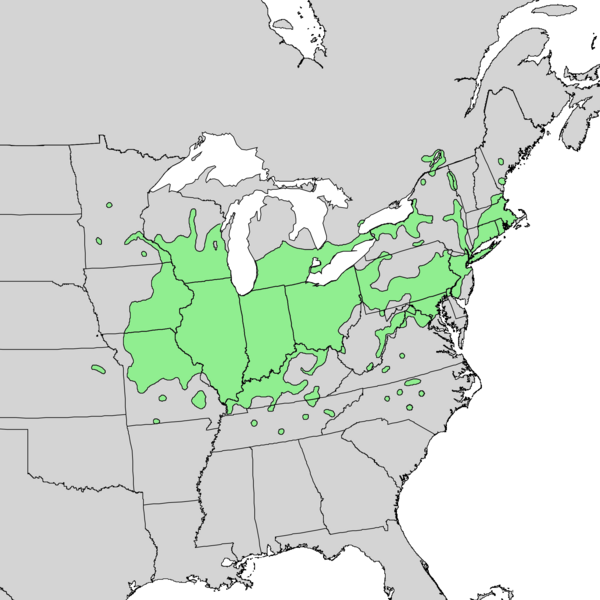Swamp White Oak
Quercus bicolor Willd.
Description
Swamp white oak belongs to the beech family (Fagaceae) and is a medium sized tree that may reach 75 feet in height ¹. It is a long-lived tree that may reach 300 years ¹. On mature trunks its bark is grayish-brown and breaks off in thin curling strips ³. The deciduous leaves are 3 to 7 inches long and up to 4 inches wide with 6 to 10 pairs of large rounded teeth ³. The upper side is dark green and glossy, but the lower surface is velvety with silvery or yellowish hairs ³. The brown acorns are 0.5 to 0.75 inch long and are covered one-third to one-half with a cap ³. The acorns are borne in pairs on one to two-inch stalks, which distinguishes it from other similar oaks ³. Acorns mature in one season and germinate when they drop in the fall ³.

Bark of swamp white oak. Wikimedia commons 4

Leaves of swamp white oak. @ D. Cameron*, Go Botany 9

Acorn with stalk of swamp white oak. Wikimeida commons: Swamp white oak 4
Distribution
Swamp white oak is distributed from southwestern Maine to southeastern Minnesota and south to Missouri and Maryland ¹. It is scattered in surrounding areas. In Maryland it is primarily found on the coastal plane ², but may extend to Allegany County along the Potomac River.

Natural range of swamp white oak. Wikimedia commons 4
Economic Importance
The inner bark was used for tanning leather and also produces a yellow dye ³. The abundance of knots reduces the value of the wood for making furniture ³. The wood is used for vines, flooring, interior furnishings. kegs and barrels 6. It is often planted for shade trees in parks6.
Wildlife Importance
Like other oaks, swamp white oak is an important wildlife species; Its foliage supports numerous larvae of butterflies and moths such as the Imperial Moth and several hairstreak butterflies ³. The acorns are eaten by birds such as bluejays and turkeys in addition to mammals such as white tailed deer and black bear ³.
Threats
Swamp white oak is not seriously threatened by disease, but is susceptible to oak wilt ³.
Interesting Facts
- The Maryland State Champion swamp white oak is in Prince Georges County. It measures 109 feet tall and 75.8 inches in diameter 7.
- The National Champion swamp white oak is in New Jersey and is shorter at 105 feet, but larger in diameter at 85.3 inches 8.
- Swamp white oakOne interssting interaction is with the Lobed Oak Gall Wasp, Andricus quercusstrobilanus, that causes little damage but produces a distinctive gall 5.

Galls of Llobed Gall Wasp. R. R K kirt, Wikicommons 4
References
- USDA Forest Service Silvics, Vol 2–Hardwoods: Quercus bicolor
- Maryland Biodiversity Project: Swamp white oak
- North Carolina State Extension: Quercus bicolor
- Wikimedia commonst: lobed oak gall on Quercus bicolor
- iNaturalist: Lobed Oak Leaf Gall Wasp
- USDA NRCS Plant Guide: Swamp white oak
- Maryland Big Trees
- American Forests, Champion Trees: Swamp white oak
- Go Botany: Quercus bicolor
Contributed by J. Hull
* Image used with permission of photographer.
Towson University Glen Arboretum
